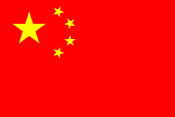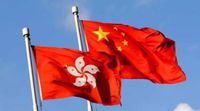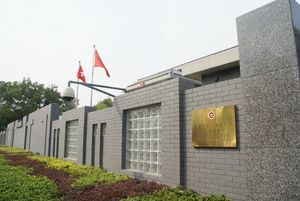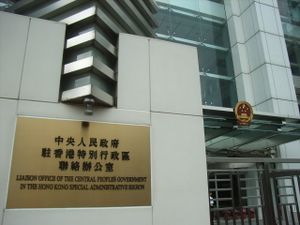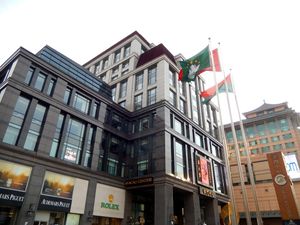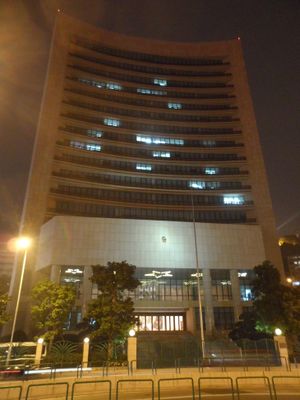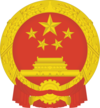بلد واحد بنظامين
| ||||||||||||||||||||||||||||
"بلد واحد بنظامين" (One country, two systems) هو مبدأ دستوري صاغه دنگ شياوپنگ، الزعيم الأعلى لجمهورية الصين الشعبية (PRC)، لإعادة توحيد الصين في مطلع ع1980. إذ اقترح أنه سيكون هناك فقط صين واحدة، ولكن مناطق صينية متميزة مثل هونگ كونگ و مكاو يمكن أن تحتفظ بأنظمتها الاقتصادية والادارية، بينما باقي جمهورية الصين الشعبية (أو ببساطة "الصين") يستخدم نظام الاشتراكية بخصائص صينية. وتحت هذا المبدأ يمكن لكل من المنطقتين أن تواصل الاحتفاظ بنظامها الحكومي وشؤونها القانونية والاقتصادية والمالية، بما في ذلك علاقات تجارية مع دول أجنبية.
خلفية في سياق هونگ كونگ
كانت هونگ كونگ مستعمرة للمملكة المتحدة، يدير شؤونها حاكم طيلة 156 سنة منذ 1841 (باستثناء أربع سنوات من الاحتلال الياباني أثناء الحرب العالمية الثانية) حتى 1997، حين أعيدت إلى السيادة الصينية. كان على الصين قبول بعض الشروط، المنصوص عليها في الإعلان المشترك البريطاني الصيني، مثل صياغة واعتماد دستور مصغر لهونگ كونگ قبل عودتها. ضَمَن القانون الأساسي أن هونگ كونگ سوف تحتفظ بنظام اقتصادي رأسمالي وبعملتها الخاصة (دولار هونگ كونگ)، ونظام قانوني، ونظام تشريعي، وبحقوق وحرية الشعب لخمسين سنة، as a كمنطقة ادارية خاصة (SAR) في الصين. هذه الترتيبات الحالية ينتهي سريانها في 2047، ولذلك فقد أتاحت لهونگ كونگ التصرف ككيان منفرد في العديد من المحافل الدولية (مثل WTO و الألعاب الأولمپية) rather than as a part of China.[1][2][3]
الرنمين بي الصيني ليس عملة قانونية في هونگ كونگ. وبالمثل، فإن دولار هونگ كونگ غير مقبول في المتاجر في الصين. وبهذا الترتيب، فإن إذناً أو ڤيزا مطلوبة لعبور حدود هونگ كونگ مع الصين، والناس في هونگ كونگ عموماً يحملون جواز سفر هونگ كونگ، م.ا.خ. بدلاً من جوازات السفر الصينية. اللغات الرسمية هي عامل رئيسي بجانب تاريخ المستعمرة السابقة جعل هونگ كونگ والصين متمايزتين عن بعضهما البعض، إذ أن الكانتونية و الإنگليزية هما اللغتين الأوسع انتشاراً في هونگ كونگ بينما المندرين هي اللغة الرسمية للصين. وتحتفظ الحكومة المركزية في بكين بالسيطرة على الشئون الخارجية لهونگ كونگ وكذلك التفسير القانوني للقانون الأساسي. وهذا الأخير أدى إلى أن يجادل دعاة الديمقراطية وبعض سكان هونگ كونگ أن الإقليم لم يحصل بعد على الحق الشامل للاقتراع كما وعد به القانون الأساسي، مما أدى إلى المظاهرات العارمة في 2014.[1][2][3]
هونگ كونگ ومكاو
|
اقترح دنگ شياوپنگ تطبيق المبدأ على هونگ كونگ في المفاوضات مع رئيسة الوزراء البريطانية، مارگرت ثاتشر حول مستقبل هونگ كونگ حين تنتهي فترة إيجار الأراضي الجديدة (بما في ذلك نيو كاولون) في هونگ كونگ للمملكة المتحدة في 1997. نفس المبدأ قد اُقتُرِح في مباحثات مع البرتغال حول مكاو.
المبدأ هو، بمجرد إعادة التوحيد، بالرغم من ممارسة الاشتراكية في بر الصين الرئيسي، فإن كلاً من هونگ كونگ ومكاو، اللتين كانتا مستعمرتين للمملكة المتحدة والبرتغال بالترتيب، بإمكانهما الاحتفاظ بنظاميهما المستقرين وذلك تحت درجة عالية من الاستقلال الذاتي لما لا يقل عن 50 سنة بعد إعادة التوحيد. ما سيحدث بعد 2047 (هونگ كونگ) و 2049 (مكاو) لم يُذكـَر على الملأ.
Chapter 1, Article 5 of the Hong Kong Basic Law, the constitutional document of the Hong Kong Special Administrative Region, reads:[4]
The socialist system and policies shall not be practised in the Hong Kong Special Administrative Region, and the previous capitalist system and way of life shall remain unchanged for 50 years.[5][6]
The establishment of these regions, called special administrative regions (SARs), is authorised by Article 31 of the Constitution of the People's Republic of China, which states that the State may establish SARs when necessary, and that the systems to be instituted in them shall be prescribed by law enacted by the National People's Congress in light of the specific conditions.
The SARs of Hong Kong and Macau were formally established on 1 July 1997 and 20 December 1999 respectively, immediately after the People's Republic of China (PRC) assumed the sovereignty over the respective regions.
الإطار
التنفيذ
رؤية تآكل الاستقلال الذاتي لهونگ كونگ
أثناء احتجاجات هونگ كونگ 2014, students demanded more political freedom in direct response to the "831 decision" of the NPCSC. The participants demanded freedom of choice, electoral freedom, democracy and, in particular, they wanted to participate in the elections of the head of the administration of Hong Kong. The name "umbrella movement" originated because the students protected themselves with umbrellas from the pepper spray of the police. Thus, umbrellas became the symbol of this movement.[7] In 2016, Joshua Wong, Alex Chow and Nathan Law, student leaders of the protests, were indicted for their roles in the protests and found guilty.
قضية باعة كتب كوزواي باي
The disappearances of five staff at Causeway Bay Books – an independent publisher and bookstore – in October to December 2015 precipitated an international outcry as cross-border abductions were widely suspected. Although at least two of them disappeared in mainland China, one in Thailand, one member was last seen in Hong Kong, but apparently had found his way across the Chinese land border in Shenzhen without the necessary travel documents.[8] The unprecedented disappearance of a person in Hong Kong, and the bizarre events surrounding it, shocked the city and crystallised international concern over the suspected abduction of Hong Kong citizens by Chinese public security bureau officials and their likely rendition, in violation of several articles of the Basic Law and the one country, two systems principle.[9][10][11] It was later confirmed that they are under detention in mainland China although most had reappeared in Hong Kong and cancelled their missing persons' reports with the police.
حظر حزب هونگ كونگ الوطني
On 17 July 2018, the Hong Kong Police Force served the party convenor a notice under the Societies Ordinance, seeking to ban the Party for sedition, on grounds of national security with respect to Chinese territorial integrity. The party and its convenor Andy Chan submitted their case against being outlawed. Ten days later, in an unprecedented move, Secretary for Security John Lee on 24 September 2018 officially banned the party on national security grounds.[12]
خلفية في سياق مكاو
Macau was a colony of Portugal, ruled by a governor for 442 سنة من 1557 (except for 4 years of limited Japanese occupation during WWII, because of Japanese respect to Portuguese neutrality) until 1999, when it was returned to Chinese sovereignty. China had to accept some conditions, stipulated in the Joint Declaration on the Question of Macau, such as the drafting and adoption of Macau's mini-constitution before its return. Like Hong Kong, the Basic Law ensured Macau will retain its capitalist economic system and own currency (the pataca), legal system (which is based on Portuguese civil law), legislative system, and people's rights and freedom for 50 years, as a special administrative region (SAR) of China. Set to expire in 2049, the current agreement has permitted Macau to function as its own entity in many international settings (e.g., WTO and the Olympics) rather than as a part of China.
مقارنة بالمقترحات للتبت
Jiang (2008) notes that the concept of "one country, two systems" is based on the Seventeen Point Agreement for the Peaceful Liberation of Tibet signed in 1951, and that its mechanism is similar to how the Qing emperor integrated new territories it had conquered by permitting local elites in these regions to continue to enjoy power for a time and to exercise autonomy without apparently threatening distinct local customs. As the concept was merely a "tactical and transitional arrangement", a point of view argues that the territory of Hong Kong will gradually experience the same fate as Tibet since 1959 – forced assimilation and tight direct control by the central government. Over time, full assimilation, and abolition of local autonomy, would take place in a manner "illustrative of a similar Chinese imperial expansionist mentalité".[13]
The 14th Dalai Lama's 2005 proposal for "high-level autonomy" for Tibet, evolved from a position of advocating Tibetan independence, has been compared to "one country, two systems". He has said that his proposals should be acceptable to China because "one country, two systems" is accommodated for in the Chinese Constitution. State media rejected this claim, pointing out that "one country, two systems" was designed for the capitalist social systems of Hong Kong and Macau, which had never existed in Tibet.[14]
مقترحات بلد واحد بنظامين لبلدان أخرى
Muhammad Cohen, writing for Asia Times, suggests the "one country, two systems" formula is possible solution to the Israeli–Palestinian conflict.[15]
North Korea suggests the "one country, two systems" formula to bring about Korean unification, through a confederation of two systems within one country.[16] China has also promoted the idea; the difference between North Korea's motivation and China's is that North Korea seeks to maintain two separate governments, while China seeks gradual unification as it brings stability to the Korean peninsula with one centralised government.[17]
Irish Foreign Minister Simon Coveney said the arrangement linking Hong Kong with China could be a possible solution for addressing the fate of Northern Ireland after Brexit. The border between EU member Ireland and British-ruled Northern Ireland is becoming an increasing concern in divorce talks with Britain, with Dublin demanding that the frontier remain completely open, to avoid endangering the peace process.[18]
انظر أيضاً
- التقسيمات الادارية في الصين
- قسم اداري ذاتي
- القانون الأساسي لمكاو
- الديمقراطية في الصين
- القانون الأساسي لهونگ كونگ
- قانون هونگ كونگ
- Legal system of Hong Kong
- Legal system of Macau
- Special Administrative Region of the People's Republic of China
- منطقة اقتصادية خاصة
- Suffrage
- Hong Kong–Mainland conflict
المراجع
- ^ أ ب Boland, Rory. "What Country Is Hong Kong in? China or Not?". About.com Travel.
- ^ أ ب "China Resumes Control of Hong Kong, Concluding 156 Years of British Rule". The New York Times.
- ^ أ ب "1898 and all that—a Brief History of Hong Kong." The Economist, 28 June 1997
- ^ "Chapter I : General Principles". Government of the Hong Kong SAR. 17 March 2008. Retrieved 1 November 2009.
- ^ Luo, Jing. Over A Cup of Tea: An Introduction To Chinese Life And Culture. [2004] (2004). University Press of America China. ISBN 0-7618-2937-7
- ^ Wong, Yiu-chung. [2004] (2004). One Country, Two Systems in Crisis: Hong Kong's Transformation. Lexington Books. Hong Kong. ISBN 0-7391-0492-6.
- ^ Jonathan Kaiman, Hong Kong’s umbrella revolution – the Guardian briefing, The Guardian, 30 September 2014, retrieved on 23 July 2017
- ^ "Hong Kong unsettled by case of 5 missing booksellers". The Big Story. Associated Press. 3 January 2016.
- ^ "Disappearance of 5 Tied to Publisher Prompts Broader Worries in Hong Kong". The New York Times. 5 January 2016.
- ^ Ilaria Maria Sala (7 January 2016). "Hong Kong bookshops pull politically sensitive titles after publishers vanish". The Guardian. London.
- ^ "Unanswered questions about the missing booksellers". EJ Insight. 5 January 2016.
- ^ "Hong Kong National Party's call for 'armed revolution' no mere political slogan but a threat to safety and order, security minister John Lee says". South China Morning Post. 24 September 2018.
- ^ Hung, Ho-fung. "Three Views of Local Consciousness in Hong Kong". The Asia-Pacific Journal, Vol. 12; Issue 44, No. 1; 3 November 2014.
- ^ ""One country, two systems" not possible for Tibet". China Tibet Information Center. Embassy of the People's Republic of China in the United States. 28 July 2006. Retrieved 24 August 2010.
- ^ "Try 'one country, two systems' where it might work". Asia Times. June 26, 2017.
- ^ "N. Korea proposes 'one country, two systems' reunification". The Sun Daily.
- ^ "China backs 'one country, two systems' in Korean unification effort". english.yonhapnews.co.kr. 2013-01-22.
- ^ Irish minister suggests ‘Hong Kong solution’ for post-Brexit Northern Ireland, AFP, South China Morning Post, 22 November 2017
- Articles containing صينية-language text
- Articles containing برتغالية-language text
- Articles with hatnote templates targeting a nonexistent page
- Portal templates with default image
- الفدرالية في الصين
- سياسة هونگ كونگ
- سياسة الصين
- قانون هونگ كونگ
- حكومة مكاو
- سياسة مكاو
- حكومة هونگ كونگ
- قانون مكاو
- أيديولوجية الحزب الشيوعي الصيني
